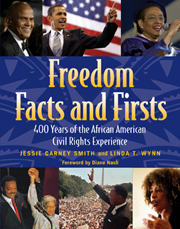African American Hero of the Day
Who, at the age of 93 years old, led and won a fight to desegregated public facilities in Washington, D.C.?
- She was a charter member of the NAACP.
- In 1895, she was appointed to the District of Columbia’s school board.
- She was elected founding president of the National Association of Colored Women (NACW).
- She wrote A Colored Women in a White World (1940).
 Mary Church Terrell (1863 – 1954)
Civil Rights Leader
Mary Church Terrell (1863 – 1954)
Civil Rights Leader
Mary Church Terrell devoted her life to civil rights causes and worked to improve the social, economic, and political conditions of African Americans. She fought for women’s suffrage, and for the rights of black women in particular. When she was 93 years old, she led and won a fight to desegregated public facilities in Washington, D.C. The Memphis native, who came from the prominent Church family, attended Oberlin College in Ohio, which, at that time, was one of the few racially integrated institutions in the nation. Terrell held various teaching positions but entered the political and professional arena after the 1892 lynching of her lifelong friend, Tom Moss, in Memphis. That year, she became head of the Colored Women’s League in the District of Columbia. After that group, the Federation of Afro-American Women, and other black women’s organizations merged to form the National Association of Colored Women (NACW), Terrell was elected founding president. Terrell became well known for the NACW’s primary cause: the fight for equal rights for women, particularly black women.
Beginning in 1895, she was appointed to the District of Columbia’s school board. She was reappointed at various times and continued to serve until 1911. She was one of the first black women in the country to hold such a position. The segregated school system in the District troubled her; thus, she fought for equal treatment of black students and black teachers. The racial disturbance in Brownsville, Texas, in 1906 distressed Terrell; she joined in protest and asked Secretary of War William H. Taft to withhold action against the black troops involved to allow for a fair hearing. Although the request was granted, the case was later dismissed. In 1949 Terrell was elected chair of the Coordinating Committee for the Enforcement of District of Columbia Anti-Discrimination Laws. The laws had been passed in 1872 and 1873 and never repealed; nonetheless, segregation in the District’s public facilities continued and blacks who tested the law were jailed. Terrell and her committee challenged the laws; she joined in several demonstrations and targeted Thompson’s Restaurant, which denied service to the group. The case finally went before the U.S. Supreme Court, which ruled in their favor, thus initiating desegregation in the District.
In addition to her work in Washington, D.C., Terrell was active in national and international programs for interracial cooperation. She was a charter member of the NAACP, founded in 1910. A prolific writer and noted public lecturer, she often wrote and spoke on themes dealing with racism and its impact on African Americans. Her personal struggles against racism were published in her autobiography, A Colored Women in a White World (1940). Terrell died on July 24, 1954, just two months after the Brown v. Board of Education decision.
From Freedom Facts and Firsts: 400 Years of the African American Civil Rights Experience by Jessie Carney Smith and Linda T Wynn. (c) Visible Ink Press(R). Essential reading about the struggle for freedom.
| < Previous Fact | Next Fact > |
Dig deeper with these related titles:
 |
African American Almanac: 400 Years of Triumph, Courage and Excellence A wealth of milestones, inspiration, and challenges met. . . The most complete and affordable single-volume reference of African... Read More » |
ISBN: 9781578593231 $29.95 |
 |
Freedom Facts and Firsts: 400 Years of the African American Civil Rights Experience Spanning nearly 400 years from the early abolitionists to the present, this guide book profiles more than 400 people, places, and events that have... Read More » |
ISBN: 9781578591923 $44.95 |
 |
Black Firsts: 4,000 Ground-Breaking and Pioneering Events, 2nd Edition Black Firsts is a testament to a rich but often overlooked part of our history. Jessie Carney Smith, William and Camille Cosby Professor of the... Read More » |
ISBN: 9781578591428 $24.95 |
 |
Black Heroes "If there is no struggle, there is no progress," wrote Frederick Douglass. "This struggle may be a moral one; or it may be a physical one; or it may... Read More » |
ISBN: 9781578591367 $69.95 |




